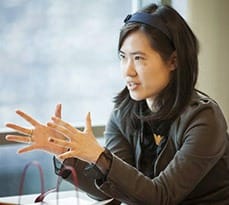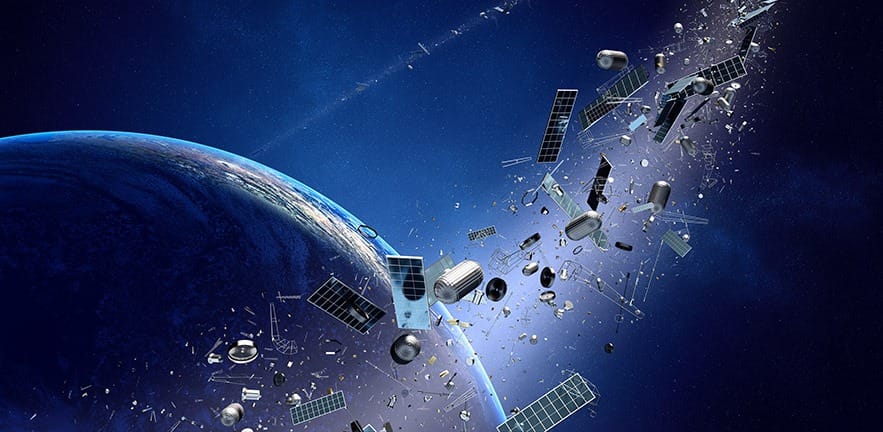Dr Nikita Chiu, a 2016 alumna of the MPhil in Technology Policy programme at Cambridge Judge Business School, worries about an improbable – but potentially catastrophic – scenario: a major orbital collision such as a satellite colliding with space debris.

“I actually can see some similarities with the Fukushima incident,” she says of the coastal Japan nuclear facility that suffered meltdown in 2011 due to a huge Pacific earthquake and tsunami. “Everyone thought meltdown at a nuclear power plant is of extremely low probability, but when the disaster struck, it had a huge impact.
“The same can be applied to space debris: the perceived probability of major satellite disruption caused by collision with space debris is very low, but if that happens the consequences can be disastrous. Our daily activities rely heavily on satellite technology: from satellite navigation to Tinder, from satellite TV to weather forecast, space technology is integral in our everyday life.
A native of Hong Kong, Nikita is Research Affiliate at the Centre for the Study of Existential Risk (CSER) at the University of Cambridge, where she’s conducting research on the possible impact of space debris.
“More and more countries and companies today are installing satellite constellations into space,” she says. “The operational lifespan for satellites is around eight years. At the end of their missions, many satellites remain in orbit and become space debris. Some continue to occupy valuable orbital positions which leads to increasing orbital congestion.”
The European Space Agency estimates that there are more than 18,000 objects in orbit; most of these are space debris, but seven per cent of these are operational satellites. Non-functioning satellites which ran out of fuel can also be categorised as space debris, posing risks to other functioning satellites, Nikita says.
Nikita attended the International Astronautical Congress (IAC) in Australia earlier this year. She was also invited to present on global space governance and space sustainability at the 2017 United Nations / UAE High Level Forum on Space. Holding a PhD in International Relations, Nikita combines her expertise on global governance with her recent studies on technology policy to provide practical recommendations to address the problem of space debris through promoting space sustainability.
“Immaterial space resources, such as orbital slots and radio frequency, are actually limited, natural resources, very much like the ocean and the planet that we pledged to protect,” she says. “As finite resources, these resources should be considered as global commons that require global efforts to ensure their sustainable use.”
Nikita is currently working towards the development of a multi-stakeholder framework aimed at reducing and mitigating risk posed by space debris. Through facilitating dialogue on the prospect of establishing common docking practices and interfaces, she would like to see future satellites become serviced for repairing and refuelling in order to extend their lifespan. She hopes that the initiative could be adopted internationally, engaging both governments and private businesses.
“As academics we have a duty to raise awareness to important issues that are often overlooked and understudied. We have known about the consequences of climate change since late 19th century. However, it has taken the international community decades of discussions to converge on the topic and committed to actions,” she says. “We would need to start the dialogue now and to engage the public about challenges posed by space debris.”
Nikita became involved in space research during her doctoral studies at The Graduate Institute of International and Development Studies in Geneva, while preparing her thesis on global nuclear governance. In spite of the lack of a national spaceport, the UK actually has a considerable space industry, with six per cent of global market share, and the UK is particularly strong in space applications, data and services. Nikita says Cambridge is a good place for her to continue her research. Her MPhil studies at Cambridge Judge helped her to gain understanding of the intersection of many disciplines and how to leverage dialogue between them.
In her free time, Nikita is a movie aficionado. While there have been many recent space-themed movies such as The Martian, Interstellar and Gravity, she wonders whether major films really help people understand the issues surrounding space and technology.
So Nikita reckons that movies could have a more significant role in educating the public – and suggests that academics and scientists partner with the film industry in raising awareness on pressing issues. “If each high-profile premiere could send out an accurate message on emerging technologies, then it would remedy a lot of the misinformation circulated in the age of information abundance.”
Nikita is interested in hearing from…
…leading researchers in the field of technology policy and global governance, experts from the space and satellite applications sector.


